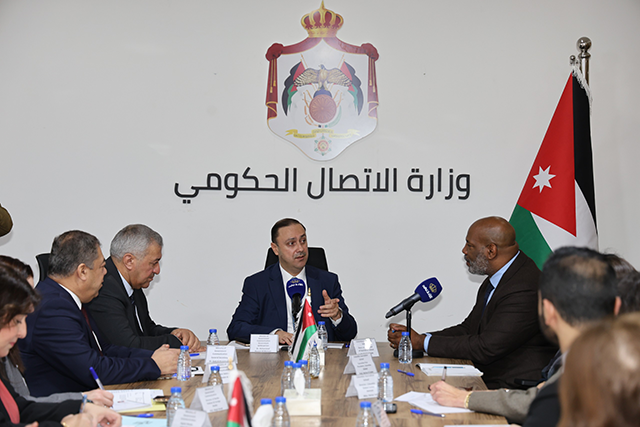You are here
ARIJ holds webinar on countering misinformation related to climate change
By Mays Ibrahim Mustafa - Jul 07,2022 - Last updated at Jul 07,2022

ARIJ holds webinar on countering misinformation related to climate change
AMMAN — The Arab Reporters for Investigative Journalism (ARIJ) media organisation on Wednesday held a virtual webinar session titled, “How to counter false and misleading information related to the climate?”
The online session hosted climate experts from the Science Feedback organisation, who discussed how to best handle climate issues and misinformation relating to them.
According to its website, Science Feedback is a non-profit organisation specialised in fact-checking science-based media coverage, particularly that relating to the climate and health.
Katie Valentine, an editor at Science Feedback, noted that carbon dioxide is “the main driver of climate change worldwide”, making up 76 per cent of the emissions.
According to Valentine, carbon dioxide concentrations have grown from about 315 to over 415 parts per million. Moreover, the earth’s temperature has risen by 0.14 degrees Fahrenheit per decade since 1880.
She also noted that the Middle East is one of the most vulnerable regions in the world to climate change, and a recent study found that temperatures in Iraq “are rising two to seven times faster than global temperatures”.
She added that this shows that humans are “significant enough to cause major environmental changes”.
Valentine also gave attendants a brief over the fact-checking and reviewing process of Science Feedback, using a case study of a scientific review on an article containing misinformation.
After identifying a false claim, the journalist must understand its basis and where it is coming from, reaching out to scientists for feedback, resulting in a correction.
Emmanuel Vincent, founder and director of Science Feedback, said: “When you speak about science you have to be precise in what you are referring to because sometimes misinformation comes from not using the right terms,”
According to Vincent, Science Feedback is “a signatory of the International Fact-Checking Network”, a required condition for its partnership with Facebook.
If it was found that any viral news content on Facebook contains “false, misleading, or missing information, we communicate that to Facebook”, which then displays a notification on the content, informing users that it contains false information, he said.
Valentine also spoke of potential pitfalls when reporting on science.
It is important that journalists and fact-checkers are cautious not to engage in the same mistakes of “purveyors of misinformation”, such as “cherry-picking”, by, for example, only referring to the one study that supports something they want to prove, she said noting that “a single study doesn’t revolutionise an entire field”.
The two experts also introduced the Climate Science Desk portal created by Science Feedback to help journalists and fact-checkers “verify the veracity of a climate science-related claim” by reaching out to the editors at Science Feedback, who either provide a response or put them in touch with a scientist.
“The goal of this is to increase the number of organisations that are tackling climate change in their work and expand the climate coverage of those organisations that are already tackling it,” Valentine said.
Related Articles
NEW YORK — Facebook is taking new measures to curb the spread of fake news on its huge and influential social network.
WASHINGTON — A digital tool considered vital in tracking viral falsehoods, CrowdTangle will be decommissioned by Facebook owner Meta in a ma
AMMAN — Minister of Government Communications Mohammad Momani on Monday met with a delegation from Columbia University’s School of Journalis


















